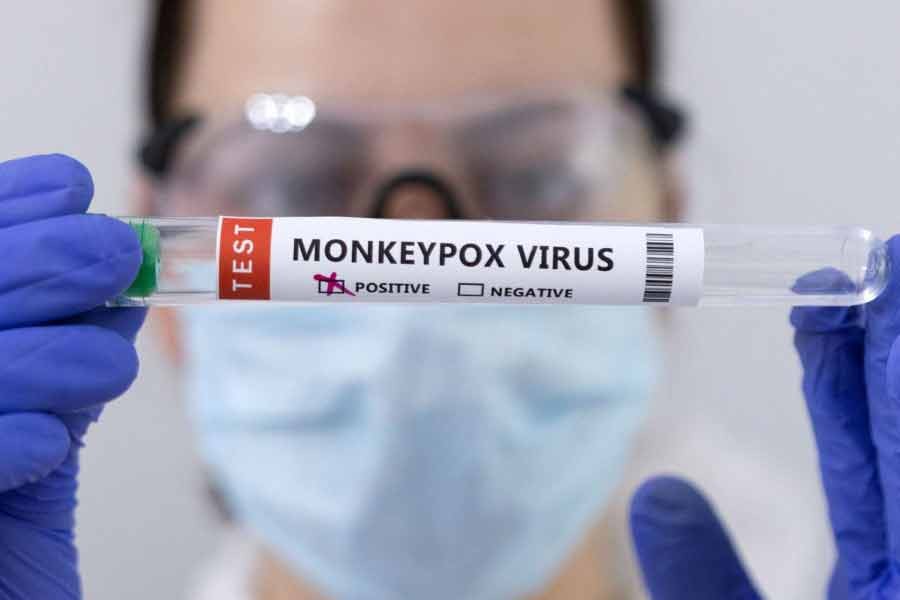
Published :
Updated :

The World Health Organization (WHO)'s Director General (DG), Dr Tedros Adhanon Ghebreyessus, has declared monkeypox outbreak a global health emergency.
Such classification of the viral disease's outbreak by WHO also indicates that the global alert against the monkeypox outbreak is at its highest level.
Interestingly, the WHO DG has declared this health emergency in his personal capacity as the global health watchdog's head, since WHO's health emergency committee on the virus failed to reach a consensus on whether the outbreak should be classified as a global health emergency or not.
Talking of similar WHO-declared global health emergencies, there are two other emergencies. One relates to coronavirus, while the other is concerned with polio.
The concern as expressed by the WHO DG should be taken seriously by all concerned. In fact, the behaviour of the monkeypox virus, which belongs to the family of small pox, though less deadly, is still unknown to scientists. So, there is an element of uncertainty about how exactly it transmits among the populace.
The areas where the disease is endemic are the remote parts of Central and West Africa.
The more than 16,000 cases reported from some 75 countries across the globe so far have no history of having travelled to those parts of the African continent. So, the question that would of necessity arise is how was the disease transmitted to those people dispersed over so many countries?
Closer to home, according to media reports, a man in his early 30s who has no history of foreign travel has been tested positive for monkeypox In Delhi, the Indian capital.
This is the fourth case of monkeypox infection in India. Earlier, three other monkeypox cases were reported from the South Indian state of Kerala.
Though there is no such report of monkeypox infection yet from Bangladesh, that is no reason to be relaxed, especially, when Bangladesh has a long common land border with India.
Scientists, however, think somehow the infection is occurring at the community level n those countries.
So far, only five deaths have been reported from among the monkeypox cases.
According to WHO, globally, monkeypox poses a moderate level of risk to public health. But in Europe, the threat level is high.
To contain the outbreak, Dr Tedros was for taking necessary measures for groups at high risk.
And the people at highest risk, according to experts, are gay or bisexual men. In truth, 98 per cent of the infected people were found to belong to that group. So, it is important that necessary information and measures for containment of the disease are readily available to these groups of people at the highest risk.
Hiding information about the disease due to social stigma attached to the infection can be a big challenge before the community health workers engaged in combating spread of monkeypox in a society.
The disease spreads through close contact with infected people. The paths through which the virus may infect a person may be through her/his broken skin, respiratory tract, mouth, nose and eyes. Infected pets or animals including rats, squirrels, monkeys can be a source of infection. Even infected objects like clothes and beds can be sources of contamination.
The virus is rather mild, more like chicken pox.
The disease symptoms include high fever and swollen nymph nodes accompanied by very painful and itchy, blistery, chickenpox-like rash or lesions commonly on the face or mouth or genitals. The infection then spreads to other parts of the body such as palms of the hand and soles of the feet. The rash goes through a healing process finally forming a covering of dried blood, a scab, which later falls off. The disease can cause headache, aching of body muscles, back pain, etc.
Usually, the symptoms of the infection disappear on their own within two to three weeks.
However, small pox vaccine, Imvanex, developed by the Danish drugmaker Bavarian Nordic, has been found to be effective against monkeypox. Antiviral drugs including tecovirimat can also be used to treat the disease.


 For all latest news, follow The Financial Express Google News channel.
For all latest news, follow The Financial Express Google News channel.